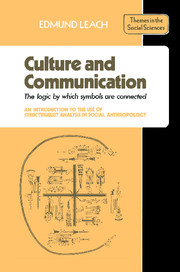 Culture and Communication
Culture and Communication Book contents
- Frontmatter
- Contents
- Culture and communication: the logic by which symbols are connected
- Introduction
- 1 Empiricists and rationalists: economic transactions and acts of communication
- 2 Problems of terminology
- 3 Objects, sense-images, concepts
- 4 Signals and indices
- 5 Transformations
- 6 Theories of magic and sorcery
- 7 The symbolic ordering of a man-made world: boundaries of social space and time
- 8 The material representation of abstract ideas: ritual condensation
- 9 Orchestral performance as a metaphor for ritual sequence
- 10 The physiological basis of sign/symbol sets
- 11 Mapping: time and space as reciprocal representations
- 12 Rank order and orientation
- 13 Examples of binary coding
- 14 Mating prescriptions and proscriptions
- 15 Logic and mytho-logic
- 16 Basic cosmology
- 17 Rites of transition (rites de passage)
- 18 The logic of sacrifice
- 19 Conclusion
- Bibliography
- Index
2 - Problems of terminology
Published online by Cambridge University Press: 05 June 2012
- Frontmatter
- Contents
- Culture and communication: the logic by which symbols are connected
- Introduction
- 1 Empiricists and rationalists: economic transactions and acts of communication
- 2 Problems of terminology
- 3 Objects, sense-images, concepts
- 4 Signals and indices
- 5 Transformations
- 6 Theories of magic and sorcery
- 7 The symbolic ordering of a man-made world: boundaries of social space and time
- 8 The material representation of abstract ideas: ritual condensation
- 9 Orchestral performance as a metaphor for ritual sequence
- 10 The physiological basis of sign/symbol sets
- 11 Mapping: time and space as reciprocal representations
- 12 Rank order and orientation
- 13 Examples of binary coding
- 14 Mating prescriptions and proscriptions
- 15 Logic and mytho-logic
- 16 Basic cosmology
- 17 Rites of transition (rites de passage)
- 18 The logic of sacrifice
- 19 Conclusion
- Bibliography
- Index
Summary
When we are in the company of close friends and neighbours we all take it for granted that communication is a complex continuous process which has many non-verbal as well as verbal components. It is only when we meet with strangers that we suddenly become aware that, because all customary behaviours (and not just acts of speech) convey information, we cannot understand what is going on until we know the code. How then should we set about decoding other people's customs?
We can usefully distinguish three aspects of human behaviour:
natural biological activities of the human body – breathing, heartbeat, metabolic process and so on;
technical actions, which serve to alter the physical state of the world out there – digging a hole in the ground, boiling an egg;
expressive actions, which either simply say something about the state of the world as it is, or else purport to alter it by metaphysical means.
Besides ordinary verbal utterances, expressive actions obviously include gestures, such as nodding the head, pulling faces and waving the arms, but they also include such behaviours as wearing a uniform, standing on a dais, and putting on a wedding ring.
My three aspects of behaviour are never completely separable. Even the act of breathing is ‘expressive’ – it ‘says’ that I am still alive. Even the simplest technical action has both biological and expressive implication. If I make myself a cup of coffee it not only alters the state of the world out-there, it also stimulates my internal metabolic processes, and it ‘says’ something.
- Type
- Chapter
- Information
- Culture and CommunicationThe Logic by which Symbols Are Connected. An Introduction to the Use of Structuralist Analysis in Social Anthropology, pp. 9 - 16Publisher: Cambridge University PressPrint publication year: 1976
